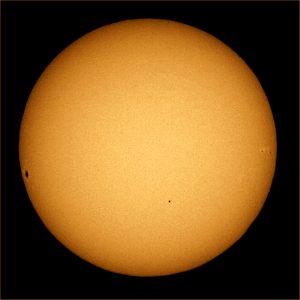Leslie Rodriguez

Mercury, visible as a small black dot, makes its transit across the sun.
News Writer
[email protected]
Early Monday afternoon the sun shined a bit brighter than usual over UNC Asheville’s quad. A large group of students and visitors stood in the center, not just standing, but waiting in line. Four large telescopes sat in a line in the center of the group, people taking a moment to look into the telescope, pausing for a bit and shortly looking back up with an expression of wonder. Looking inside the telescope shows a completely yellow circle, however a small black speck can be seen on top of it. That is Mercury, a sight that hadn’t been seen in years.
Lookout Observatory allows for a special viewing of Mercury against the sun that won’t be seen for 13 years.
“The alignment with mercury and the sun and us is in a very unique position that doesn’t happen that often. It gives us a different view of our sun that we usually get to see it actually blocked by a planet. It’s essentially an eclipse that with a tiny, tiny little planet instead of that’s far away from us instead of the moon,” said physics lecturer, Judy Beck.
Lookout Observatory is dedicated to allowing the community a chance to view and understand aspects of astronomy that they might not have the opportunity to enjoy. During the day, a group of volunteers from the observatory gathered on the quad to allow UNCA a chance to view a glimpse of the planet Mercury in front of the sun, Drew Griffith, an astronomy minor working with the observatory said.
“A transit of Mercury across the face of the sun is a pretty rare event. So we’d like to give people the opportunity to see it,” Beck said.
Mercury would set orbit in front of the sun for only one day, allowing just enough time for observatory to place special telescopes on the quad that would safely allow people to see the planet.
“Since we’re looking at the sun, we have a filter that’s on it that takes out like 99% of the light,” Griffith said. “So you have just a very small percentage of light where you’re able to see the sun.”
A much larger group than expected gathered on the quad to view the planet. Members of the observatory were glad to see so many people interested in the event as well as positive reactions, Griffith said.
“We have several students out here working with the telescopes and they are doing a great job showing this astronomical event to people who stopped by and everyone, students, faculty, staff, family members who’ve stopped by, have been enthusiastic and appreciative of being able to see this,” Beck said.
Tess McCaleb, a junior on campus, took a trip with her class to see Mercury and is glad to have local resources that allow her a rare opportunity like this one.
“This is one of those things that you don’t get unless you’re on a college campus, just random telescopes set up so you could see the planets. So I totally recommend to other people,” McCaleb said.
Griffith has been excited about the event for days and has finally been given the chance to personally view all of the planets in our solar system through a telescope. It’s important to share science and experiences like these with the community and he as well as other participants enjoy the opportunity to do so.
“I think it’s important because for us especially, it’s fun to be able to show what we’re passionate about to the community and share it with them. I think it’s just really good for people to see what else is out there in the universe, like what’s in the solar system? And to see how great it is. I mean just looking at the smallest speck against the sun, it’s like everybody loves it,” Griffith said.
“It was cool knowing that it’s not going to be for years that you were able to see that again. It was crazy. I’m glad they had it set up today,” McCaleb said. “It gives you a bigger perspective on like there really is a planet up there and they don’t see it usually.”
Griffith said the observatory has several opportunities similar to this one throughout the year for the community to be involved in and encourages others to register for the observatory’s monthly star gazes.

















